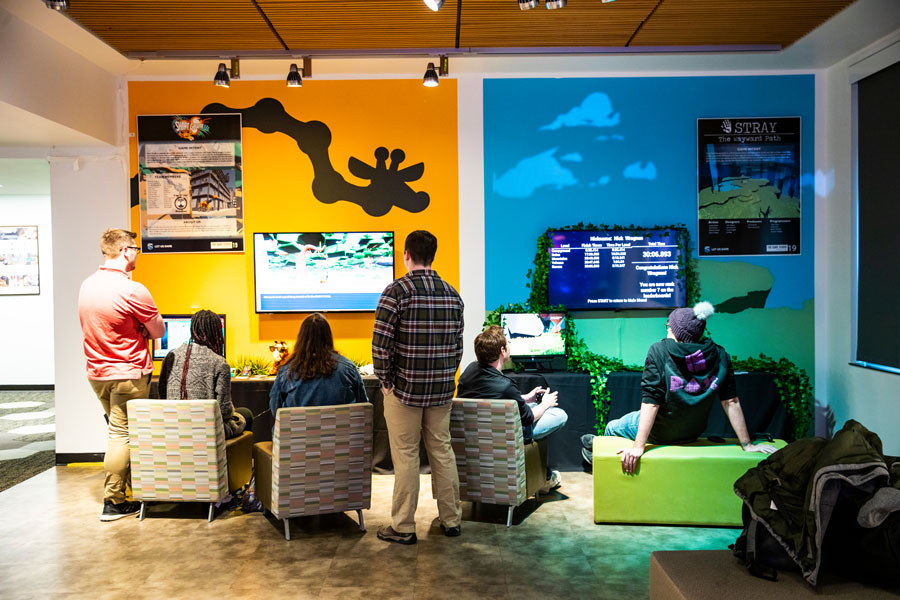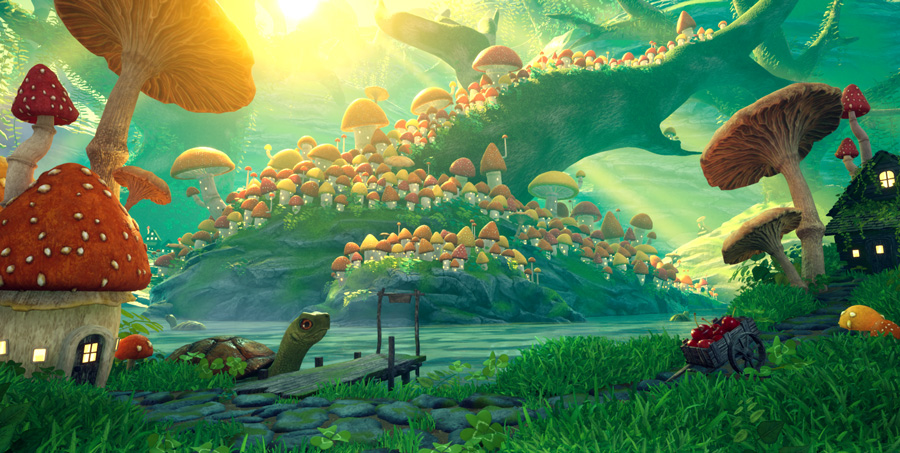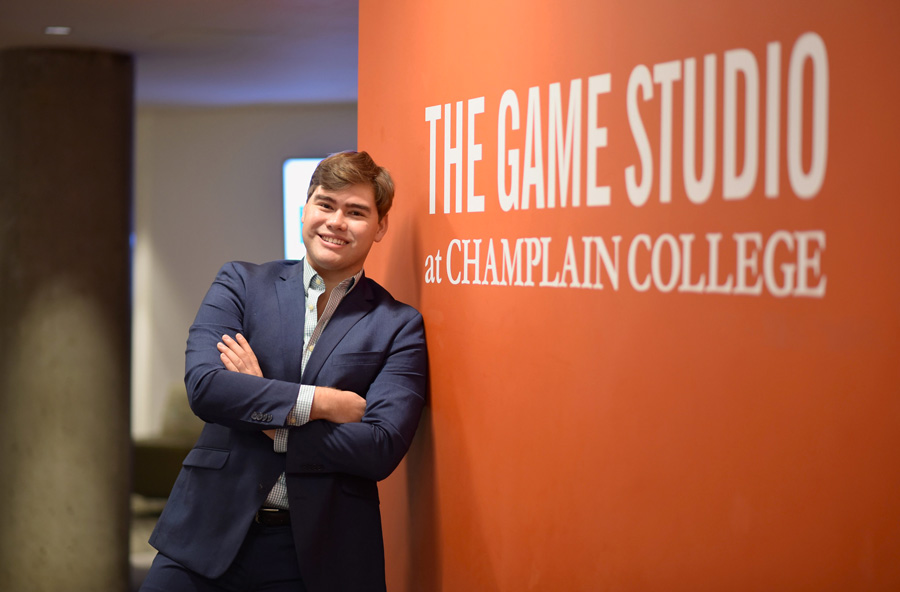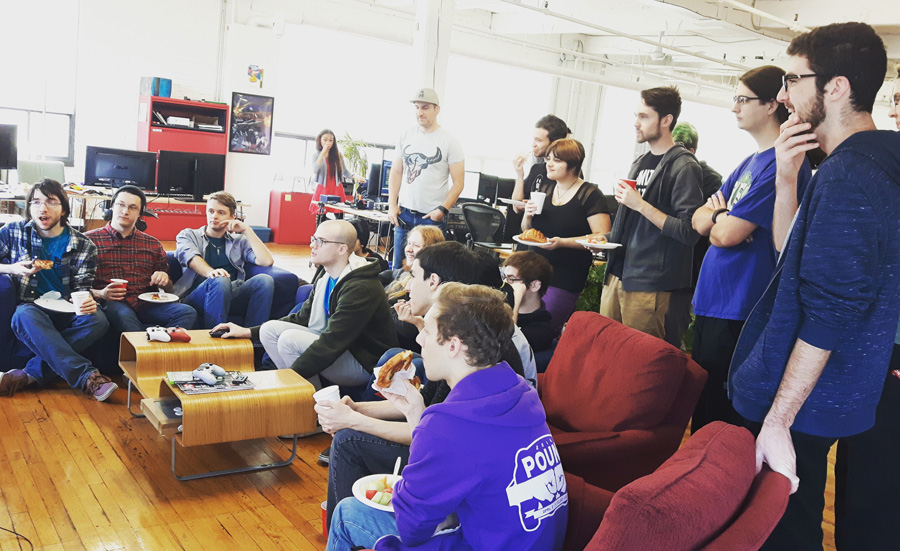These are extraordinary times, and we have an extraordinary show for you to see. It involves adventure, stories, puzzles, a voyage or two, combat, virtual reality—and a frog that needs a bath. Make sure you check it out on the Game Studio at Champlain College’s website!
The final weeks before the Game Studio’s Senior Show are notoriously intense. Every spring for the past 13 years, graduating seniors in Champlain’s four game majors work around the clock to refine the games they’ve been creating over the course of their senior year. At the same time, they’re finessing their portfolios, honing their presentations, and polishing their LinkedIn profiles. When the Show goes live and the teams finally launch their games, everyone in the audience—which includes family and friends, recruiters and game-industry insiders—is blown away by the quality of the work. The Senior Show is a testament to all the graduates have learned and achieved.
This year, while we can’t gather to celebrate with the teams, we can make sure to cheer them on and share their accomplishments. To that end, the 2020 Senior Show was held online at gamestudio.champlain.edu on Friday, May 8th. The show included a livestream featuring the eight senior games and graduates’ individual reels, plus a few surprises along the way. You can follow the Twitch stream as host Julien Huguet plays through all of the games in this year’s lineup. After the show, all of the work will be hosted and archived on Champlain’s Game Studio website where recruiters can explore at their leisure and learn more about each individual graduate.
The Game Studio Senior Show is the culminating event of an intense, year-long competition among 24 teams made up of students from each of Champlain’s four game development majors: Game Art, Game Design, Game Programming and Game Production Management. Midway through the year, game faculty determined the eight finalist games that will be presented at the Senior Show. Members of the teams that were not selected joined forces with the eight remaining teams and quickly got up to speed on a new game.
“It’s a rigorous and competitive process by design,” says Amanda Crispel, Assistant Dean of Game Development and Professor of Game Design. “Just as it is in the game industry, only the best concepts and most differentiated work will ever see the light of day. In the Game Studio, our students learn essential professional, social, and communication skills as they master the latest game development practices, processes, and techniques. Sometimes that means switching teams, and throwing themselves wholeheartedly into a new project.”
This year, a global pandemic added an extra challenge to each team’s final crunch time. “Switching to remote work was hard for everyone, regardless of their situation, but in the end we managed to pull it off,” says Leanna Russell, a graduating game artist who has been hired as a Junior Environment Artist by Vicarious Visions, a studio that helped to create games like Destiny 2 and Crash Bandicoot N. Sane Trilogy.
“Our team made time for a lot of small check-ins on specific topics and we socialized during our larger group calls,” says Russell. “We collaborated with other team members even though we were spread out across the country. I’ve learned a lot about how remote work functions and how a team deals with unexpected transitions.” Russell is the Lead Artist and Environment Artist on her team’s game, Frog Bath, a capture-the-flag game with an emphasis on fun and flexible froggy movement.
Andersen Pinckney, a Game Design major with a minor in Data Science, and Lead Designer on the Eira: Echoes of Adventure game, worked on one of the largest teams in the history of the Game Studio. “We managed 18 active developers in remote work and an additional four team members who contributed to the game,” says Pinckney. “Switching to remote work really opened our eyes. We quickly realized everything we needed to do to finish the game.” Pinckney said it was difficult to coordinate the team in the chaotic first few days of remote work, but eventually the team began to collaborate effectively once their agile Scrum practices kicked in. Scrum is the project management tool used throughout the game industry to help teams innovate faster and move from ideas to delivery more quickly. Nearly all Game Studio students become Scrum certified while at Champlain.
During the Senior Show, teams launch their games with sizzle reels and provide fully playable game demos. Each student demonstrates their work on the game and previews samples of their portfolio. This year, recruiters and game lovers can watch the reels, dive into the games, and explore graduates’ portfolios on the Game Studio website. Game industry professionals are also invited to a private Champlain College Game Studio Slack during the Senior Show to chat with the graduating developers and game faculty.


“I think recruiters love to see projects,” says Mark Botaish, a Game Programming major. “At Champlain, there is a big culture of working together with all of your friends to make a good game that you can throw up on your portfolio. It’s a great way to show recruiters you’re driven, you’re active, and you enjoy making games.”
Game Programming major Michelle Nie agrees: “Every day, I’m inspired by like-minded students who are also working incredibly hard to make incredible things. It’s less of a competition here, and more about collaboration.”
Botaish says students from all four majors work together in teams beginning in their first year. “We break off and learn our own disciplines and then come back together to make bigger projects. That approach works really well,” says Botaish. “It helps us develop our group skills, so we know how to work with different people in different disciplines on the same game, and it hones our expertise in our own discipline as we make those fully fledged games.”
Leanna Russell agrees. “Champlain is one of the few, if not the only, game program that focuses on team-based work in its curriculum. On top of our amazing work, we’re much more hireable straight out of the gate.”


Thanks to this collaborative, multidisciplinary approach, Champlain students graduate with a huge advantage when entering the highly competitive game industry. More than 85% of Champlain’s game students will be employed within six months after graduating, and 91% of them will be working in a career-relevant position. “Career outcomes are excellent for our Game Studio graduates,” says Daphne Walker, Assistant Director Career Collaborative, who coaches students on their careers and helps to connect them with recruiters.
While the field is competitive, careers are abundant for skilled workers in this thriving industry. “Video games and related content have become the new source of entertainment for a generation,” says TechCrunch. Gaming is now bigger than film and TV industries combined. With everyone forced to stay at home, the industry’s reach is only growing. Gaming recently surpassed film and television’s global box office revenues, and consumer spending on games is forecasted to grow to $196.0 billion by 2022.


Champlain’s unique Upside-Down Curriculum allows students to dive into their major-specific classes right away. “From my first day at Champlain until my senior year, I’ve been learning how to make game experiences on paper, prototype and iterate them to receive feedback, and use that feedback to bring designs to life, without ever having to wait to see if my major was right for me or not,” says Game Design major Karl Lewis. “I knew from day one that I was in the right program!”
“Our number one priority is teaching,” says Crispel, who heads up Champlain’s Game Studio. “Our entire focus is on where students need us to go for their growth. We provide them with the latest technology in six large, fully dedicated game labs. We even give them a chance to be fully immersed in the game industry at our campus in Montreal, which is one of the world’s largest gaming hubs.”


Students certainly seem to appreciate Champlain’s focus. “The game professors care about one thing: our success,” says Lewis. “They’ve really challenged me to be the best that I possibly can be and prepared me for the game and software development industries.”
Plus, students are doing what they love, as Lewis points out: “When your homework is to take a cool idea that you or your colleagues came up with and turn it into a real, tangible game experience that brings joy to other people, it’s almost impossible to not have an awesome time doing it!”
Check out the Game Studio at Champlain College’s Senior Show at gamestudio.champlain.edu.